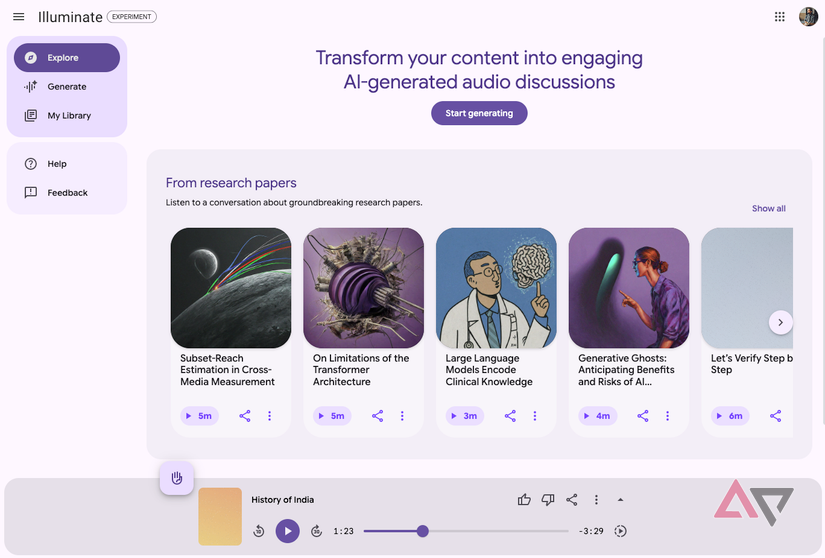I love digging into new topics, ideas, and more. Be it cutting-edge research or a deep dive into history, I like getting into the nitty-gritty details.
However, much of that treasure trove of knowledge is usually tucked behind research papers. They’re dense, technical, and the kind of reading that requires a lot of attention.
Meanwhile, blogs and YouTube explainers tend to oversimplify. Podcasts, on the other hand, are a massive time commitment. That’s why Google’s latest research project stood out to me.
Dubbed Google Illuminate, the app is an experimental product, which would explain why nobody has heard of it. It’s become the perfect accompaniment for tackling complex ideas without the overhead of using a full-fledged tool like NotebookLM.
What’s Google Illuminate?
A simpler spin on NotebookLM
The easiest way to describe Google Illuminate would be to call it a stripped-down version of NotebookLM’s highlight feature.
The app sits at an interesting cross-section of research, audio-generation, and AI.
At its most basic level, all it does is take a complicated-sounding research paper, usually pulled from arXiv, and turn it into a podcast-style conversation between two hosts.
Sounds like NotebookLM’s podcast generation? It’s pretty similar, but unlike NotebookLM, your source material is much more limited here, and the app is clearly designed to appeal to more casual users.
Google Illuminate can be pretty useful when you don’t want to wade through a research paper.
When in action, Google Illuminate does a remarkably good job of creating a radio interview or podcast-style conversation where one person asks questions, and the other responds with explanations.
This can be useful when you don’t want to wade through a research paper.
Moreover, unlike a podcast, all the information from an academic research paper is provided here.
Except this time, in a more digestible format with natural-sounding back-and-forth banter that makes it much easier to understand the concept.
The first time I used Google Illuminate, I was genuinely surprised by how engaging it was and how it shifted my approach towards complex topics that I’d have otherwise put off till I had time to sit and read.
Getting started with Google Illuminate
Built-in library, custom conversations, and a whole host of limits
Google Illuminate makes it easy to get started with a fairly exhaustive library of papers and documents that you can just straight up get started with.
These wide-ranging topics include everything from large language models encoding clinical research to the Nobel Prize for chemistry.
As diverse as the initial sampling of data is, it’s just a teaser for what the service can do. The real magic lies under the generate button. That’s the setting where you get to create your own conversation.
Unlike NotebookLM, you’re a bit limited here. You can either input the URLs for whatever you want to learn about or search for a topic.
The latter is where I started running into a few limitations. Right now, Illuminate is primarily limited to working with content from ArXiv and a small handful of other open sources.
This means open-ended searches may not necessarily produce the results you want.
For example, searching for Indian history presented a mere three information sources, none of which were actually related to history.
The first result was a research paper on the prediction of rainfall in an Indian state. Not what I was looking for.
All that to say, you still have to do some legwork to find appropriate information sources about the topic you want to research before putting Google Illuminate to the task.
For the sake of testing, I gave it the Wikipedia page for Indian history. Pretty straightforward.
Google claims that an audio generation should take about 30 seconds, but in my experience, it takes a bit longer.
Regardless, when processed, the results are pretty good. It even went so far as commenting on the challenges of condensing thousands of years of history into a single Wikipedia page. Funny.
Illuminate then runs you through the highlights and overall content of the web page in a conversational way. Tapping the hand-shaped button at the bottom lets you ask it questions.
For better or worse, Google Illuminate can only answer questions that have been directly referenced within the source material. It’s not an all-encompassing LLM that’ll dig up answers from across the internet.
Elsewhere, I found the conversation quality good, but not quite as natural-sounding as what you get on NotebookLM. That’s despite the ability to alternate between casual, formal, guided, and free-form conversation styles.
The latter two effectively let you create a unique prompt for the style in which you want the generated audio conversation to sound.
There is one more limitation that you should be aware of. Google Illuminate is restricted to just 20 generations every day.
For the most part, I don’t anticipate that being an issue, but those generations do get used up fairly quickly if you are constantly adding and removing sources to improve the quality of research.
Similarly, changing the audio style counts towards generations.
Why I keep coming back to Google Illuminate
Despite its many caveats, I’ve found myself using Google Illuminate much more than I expected.
It’s an approachable and easy way to tackle interesting topics that I want to learn about without the cognitive overload or time commitment needed to read a full paper.
It also makes me engage with topics I’d have otherwise ignored.
Sounds like a positive. It’s less of a replacement for reading than an accompaniment, and that’s a fair compromise to me. I’ll take any app that eases and encourages learning. Definitely one to try out.


